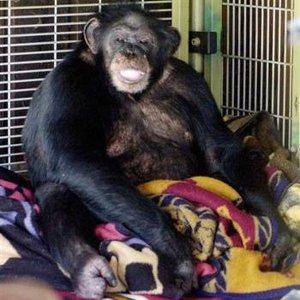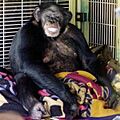Travis (chimpanzee) facts for kids
 |
|
| Species | Common chimpanzee |
|---|---|
| Sex | Male |
| Born | October 21, 1995 Festus, Missouri, U.S. |
| Died | February 16, 2009 (aged 13) Stamford, Connecticut, U.S. |
| Cause of death | Gunshot wounds |
| Known for | Attack on Charla Nash |
| Owner | Jerome Herold (died 2004) Sandra Herold (died 2010) |
| Parent(s) | Suzy (mother) (died 2001) |
| Weight | 200 lb (91 kg) |
Travis (born October 21, 1995 – died February 16, 2009) was a male common chimpanzee. He became well-known because he appeared in many TV shows and commercials. For example, he was in ads for Coca-Cola and on TV programs like The Maury Povich Show.
Sadly, on February 16, 2009, Travis attacked Sandra Herold's friend, Charla Nash. This event caused serious injuries and became a big news story around the world. After the attack, Charla Nash's family filed a lawsuit. Later, Nash reached a legal agreement with Sandra Herold's estate.
This attack, and another one involving a chimpanzee in California a few years earlier, made people talk about whether it's a good idea to keep wild animals like chimpanzees as pets. Experts like Jane Goodall and Frans de Waal shared their thoughts on this topic. The story of Travis was even featured in an episode of the TV show Fatal Attractions on Animal Planet.
Contents
Travis's Early Life
Travis was born on October 21, 1995, near Festus, Missouri. He was born at a place now called the Missouri Chimpanzee Sanctuary. When Travis was only three days old, Sandra and Jerome Herold bought him from a breeder. They named him after Sandra's favorite singer, Travis Tritt.
The Herolds raised Travis in their home in Stamford, Connecticut. Travis was like a constant companion to them. He often went with them to work and on shopping trips. The Herolds owned a company that towed cars. Travis would even pose for photos there and ride in the tow truck, buckled into his seatbelt and wearing a baseball shirt. He became quite famous in the town and would even greet police officers.
Travis's Special Abilities
Travis grew up around people, so he was used to being with humans from a very young age. A neighbor once said that he used to play and wrestle with Travis. The neighbor also mentioned that Travis always knew when to stop playing and paid close attention to his owner.
Travis was a very smart chimpanzee. He could do many things that humans do. For example, he could open doors using keys, dress himself, and water plants. He also helped feed hay to his owners' horses. Travis would eat at the table with the family and even drink wine from a glass. He loved ice cream so much that he learned when the ice cream trucks would pass by. He could use a computer to look at pictures, watch TV with a remote control, and brush his teeth. He really enjoyed watching baseball on television. Travis had even driven a car a few times!
Sadly, Jerome Herold passed away in 2004. The Herolds' only child had also died in a car accident in 2000. Because of this, Sandra Herold thought of Travis almost like her own son. She took great care of him. Sandra even slept and bathed with Travis. She said after he died, "I'm, like, hollow now. He slept with me every night."
Laws About Exotic Animals
The attack by Travis made people in Connecticut think about laws for keeping exotic animals. Richard Blumenthal, who was the Attorney General for Connecticut, said that a law from 2004 had a flaw. This law was supposed to stop people from owning large chimpanzees, but Travis was allowed because he was owned before the law started.
Mr. Blumenthal asked lawmakers to create a new law. This new law would ban all possibly dangerous exotic animals, like chimpanzees, crocodiles, and venomous snakes, from being kept in homes in Connecticut. The state's Department of Environmental Protection (DEP) also wanted a similar law. After the incident, they asked the public and police to report such pets.
In the U.S. Congress, Representative Earl Blumenauer had already suggested a law called the Captive Primate Safety Act. This law would make it illegal to sell or buy monkeys, great apes, and lemurs across state lines or from other countries. Travis's attack led to this bill being brought up again in Congress.
Some people, like Representative Rob Bishop, argued against the bill. They said it would cost a lot of money and wouldn't directly stop chimpanzee attacks on humans. He also said that such attacks are rare. However, many states and Washington, D.C. already have laws that ban primates as pets. The House of Representatives voted in favor of the bill, and many newspapers supported it. But the bill was never voted on in the U.S. Senate.
The police officer who shot Travis, Frank Chiafari, had trouble getting help for his emotional stress after the event. This led to a new law being suggested in 2010. This law would help police officers get support for mental or emotional issues after they have to use force to stop an animal.
Images for kids
See also
 In Spanish: Travis (chimpancé) para niños
In Spanish: Travis (chimpancé) para niños


